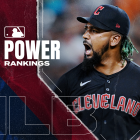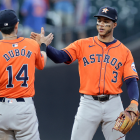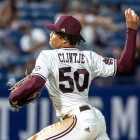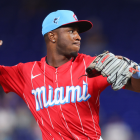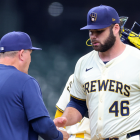BOSTON -- Saturday night the Boston Red Sox and Houston Astros will open the 2018 American League Championship Series at Fenway Park. The Red Sox (108-54) and Astros (103-59) had the two best records in baseball during the regular season. This is powerhouse vs. powerhouse.
Both ALCS teams displayed all-around excellence during the regular season. You don't win that many games by being great at one thing and OK at everything else. The Red Sox ranked first in runs scored per game (5.41) and fifth in runs allowed per game (3.99).The Astros ranked sixth (4.92) and first (3.30), respectively.
On paper, the Astros have a decided starting pitching advantage in the ALCS. That isn't to say Boston's rotation is not strong, because it certainly is, but Houston is going into the series four deep in stud starters. Look at the tentative pitching matchups:
- Game 1: Justin Verlander vs. Chris Sale
- Game 2: Gerrit Cole vs. David Price
- Game 3: Dallas Keuchel vs. Nathan Eovaldi or Rick Porcello
- Game 4: Charlie Morton vs. Eovaldi or Porcello
Like I said, on paper the Astros have the edge. Anything can happen in one individual game though. Price could get over his postseason heebie-jeebies and throw the game of his life in Game 2. Who knows? That's what makes baseball fun. It would be boring if it were predictable.
Anyway, the Astros and Red Sox have a similar pitching philosophy. There are always individual exceptions, of course, but both teams like to elevate fastballs and bury off-speed pitches. Boston threw, by far, the highest percentage of fastballs in the upper third of the strike zone and above during the regular season:
1. Red Sox: 38.0 percent
2. Mets: 31.9 percent
3. Dodgers: 31.7 percent
4. Rays: 31.6 percent
5. Yankees: 31.4 percent
...
8. Astros: 29.8 percent
...
MLB average: 27.7 percent
Clearly, both ALCS clubs make frequent use of the high fastball. What separates the Astros from everyone else is their overall fastball velocity and spin rate. During the regular season Houston posted the highest average four-seam fastball spin rate (2,366 rpm) and second-highest average four-seam fastball velocity (94.8 mph), behind only the Yankees (94.9 mph).
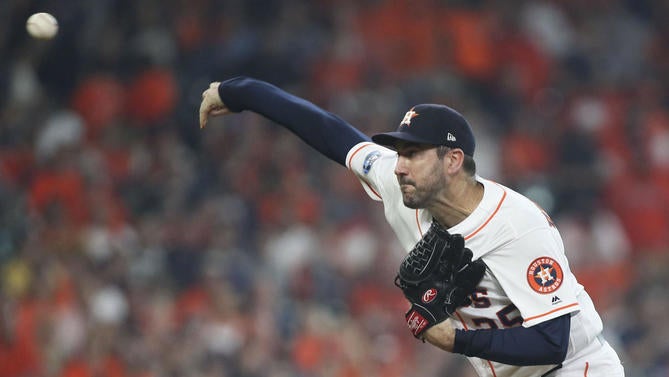
Aside from Keuchel, who is a finesse sinkerballer, the Astros are a high-velocity, high-spin fastball organization, and boy do they like elevating their fastballs. Here is the leaderboard for 95-plus MPH four-seam fastballs in the upper third of the strike zone and above this season:
- Astros: 1,792 elevated fastballs
- Yankees: 1,643
- Red Sox: 1,588
- Mets: 1,530
- Rays: 1,527
The gap between No. 1 and No. 2 is greater than the gap between No. 2 and No. 5. The Astros love, love, love elevating those high-spin, high-velocity four-seam fastballs and hey, why not? They are difficult to square up and they generate a ton of swings and misses. Add in their wicked breaking balls and it's no wonder the Astros have so much success limiting runs.
With Keuchel the notable exception, the Astros have pitchers who can elevate fastballs up and down their postseason roster. There's Verlander, Cole, and Morton in the rotation. In the bullpen you'll find Roberto Osuna, Lance McCullers Jr., Ryan Pressly, Josh James, Collin McHugh, and Hector Rondon. They're all going to feature big velocity up in the zone.
The Red Sox, moreso than any other team, did damage against elevated fastballs during the regular season. That makes them uniquely qualified to handle Houston's pitching staff, at least in theory. Here are the team's regular season numbers against those fastballs in the upper third of the strike zone:
| Red Sox | MLB average | Red Sox rank | |
|---|---|---|---|
Batting average | .272 | .224 | 1st |
Slugging percentage | .517 | .396 | 1st |
Weighted on-base average (wOBA) | .374 | .275 | 1st |
Swing-and-miss rate | 24.7% | 27.4% | 6th |
The Red Sox don't swing-and-miss often at elevated fastballs -- or, more accurately, they don't swing-and-miss as much as the rest of the league -- and when they do connect, boy do they make it count.
On an individual level, Xander Bogaerts ranked fifth among all players with a .480 wOBA against elevated fastballs this season. Mookie Betts ranked 14th with a .457 wOBA. Brock Holt ranked 15th with a .456 wOBA. Andrew Benintendi (.426 wOBA) and J.D. Martinez (.402 wOBA) were both among the top 55 hitters against high heaters as well. The Red Sox have hitters capable of handling high fastballs throughout their lineup.
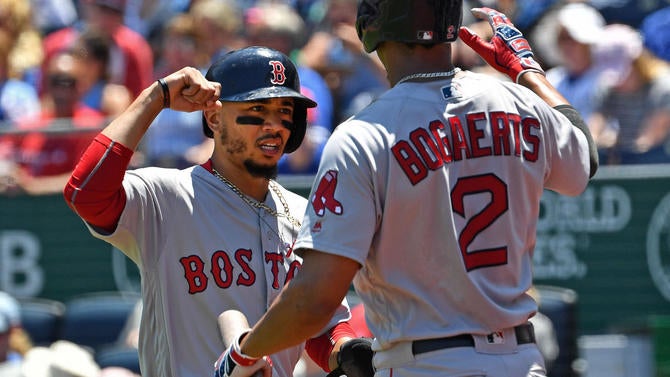
The Astros are going to attack the Red Sox with elevated fastballs -- especially with Verlander and Cole on the mound in Games 1 and 2 -- because that's what they do to everyone. Boston, meanwhile, has been the most productive team in baseball this season against the high heat. Verlander and Cole are special pitchers and perhaps their combination of velocity and spin is too great for even the mighty Red Sox. But maybe not. The Red Sox might match up perfectly against the 'Stros.
Houston is arguably the smartest and most progressive organization in baseball. I'm curious to see whether they adjust right out of the gate in the ALCS (fewer elevated fastballs? more breaking balls?) or if they wait for the Red Sox to show them they need to adjust. As productive as the Red Sox have been at hitting high fastballs this year, they are better at hitting other stuff, and the Astros might not want to fix what isn't broken, so to speak.
You can find out how to watch Game 1 of the ALCS on Saturday here or stream it live on fuboTV (Try for free).










